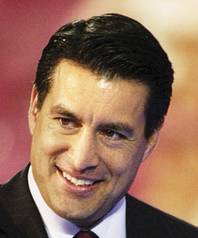Wednesday, June 22, 2011 | 2 a.m.

Brian Sandoval
Sun coverage
Sun archives
CARSON CITY — Gov. Brian Sandoval entered office with an impressive resume and sterling reputation, a moderate-to-conservative governor for a moderate-to-conservative state.
If there was a criticism, it was that he, like many Nevada politicians who climb the ranks, was too close to the traditional interests that pull the levers of power in the state.
Some are rethinking those assumptions, however, after Sandoval vetoed a bill rammed through the Legislature at the last minute.
The legislation was Assembly Bill 416, which was pushed by NV Energy, the state’s powerful electric monopoly that once employed Sandoval, and its hired lobbyists, Pete Ernaut and Greg Ferraro, the friends Sandoval credits with first suggesting he leave the federal bench to run for governor.
They both later served as volunteer campaign managers.
The veto “demonstrated he’s not owned by anybody. He’s his own man,” said Susan Fisher, a Nevada lobbyist who represented Valley Electric Association, a rural utility co-op, which opposed the bill. “It put to rest a lot of questions and rumors swirling around even before (Sandoval’s) election. These buddies, are they going to tell him how to vote? Clearly, no.”
Timothy Hay, a former state consumer advocate forced out when Sandoval was attorney general, said, “I think it showed the governor has enough independence to look beyond the short-term politics of legislation, to the long-term impacts of energy policy. It’s a refreshingly good sign to me.”
The transmission bill was NV Energy’s top legislative priority. It would have allowed the utility to build transmission lines to export power using Nevada ratepayer money to fund it, a policy that critics said risked as much as $1 billion in consumer financing.
Not only the legislation was questioned. It was the way it passed.
NV Energy lobbyists, including Ferraro and Ernaut, pushed to get the language passed in the final hour of the session, after traditional avenues to pass legislation failed. The Sun detailed the last-minute maneuvering and the fact that some lawmakers didn’t know what they had voted for.
“Media coverage played a huge role,” Fisher said, specifically pointing to the telling of the final hour.
“There are concerns about the process, the appearance of how it passed,” said former Gov. Bob List, who lobbied against the bill on behalf of a company interested in developing transmission lines. “There were political consequences for the governor if he signed it. It was a very unpopular bill.”
The bill, after it was amended, would have:
• Authorized NV Energy to fund, using Nevada ratepayer money, transmission lines to export renewable energy to other states.
• Kept agreements between large solar projects and the utility confidential.
• Allowed geothermal projects to qualify for tax breaks without county approval.
• Created incentives for renewable energy projects.
All provisions had opponents and supporters. But except for the performance-based incentives, none had gone through the normal legislative vetting process.
Critics, including the state Consumer Protection Bureau, said the transmission lines could cost $1 billion, which would have been funded by Nevadans’ electricity rates.
NV Energy called that cost estimate a “red herring.”
The bill was necessary to move Nevada forward as an energy exporter, according to the utility. It’s the only way for Nevadans to benefit from the export of energy to other states, such as California and Arizona.
The governor’s approval seemed, if not certain, at least likely.
It was, after all, the No. 1 priority of NV Energy, which spread around $300,000 to Democratic and Republican leadership during the 2010 cycle, according to followthemoney.org.
The utility hires the best lobbyists in Nevada, including the firm R&R Partners.
Sandoval’s chief of staff, Heidi Gansert, was on the Senate floor in the final hour providing information to Republicans who had concerns about the bill.
On top of that, Sandoval had worked on behalf of NV Energy shareholders in private practice in the 1990s. While running for office, he took a job with the private law firm Jones Vargas that does regulatory work for the utility.
And he did not seem sensitive to the concerns his associations had raised.
When a vacancy opened on the state Public Utilities Commission, his choice, Luis Valera, was a lobbyist unknown in energy circles but known to be a friend of NV Energy executives.
In a message accompanying his veto, Sandoval expressed concern about the policy and the potential effect of an electricity rate increase.
Sandoval and his senior staff declined to comment for this story, or provide any more background on his thought process for the veto.
NV Energy issued a statement, expressing respect for the governor.
Ernaut said: “The governor has always been his own man, but that isn’t the point here. He vetoed this bill because he disagreed with the policy.”
“There is an upside and downside with being close to the governor. The upside is our friendship, the downside is when he vetoes a bill I worked hard on, you write a story about it.”

Join the Discussion:
Check this out for a full explanation of our conversion to the LiveFyre commenting system and instructions on how to sign up for an account.
Full comments policy